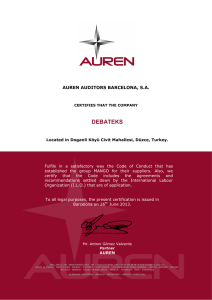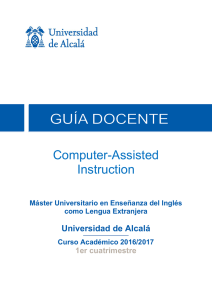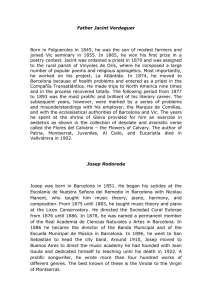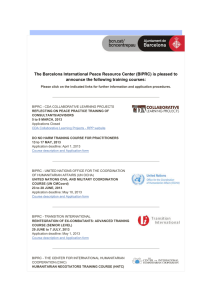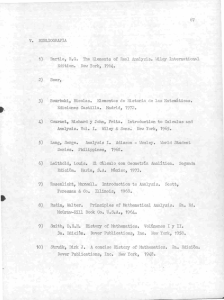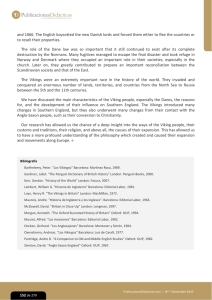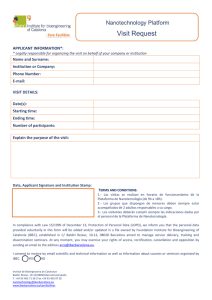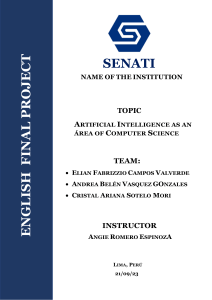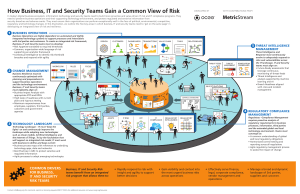Brain Evolution, Cognition and Intelligence
Anuncio
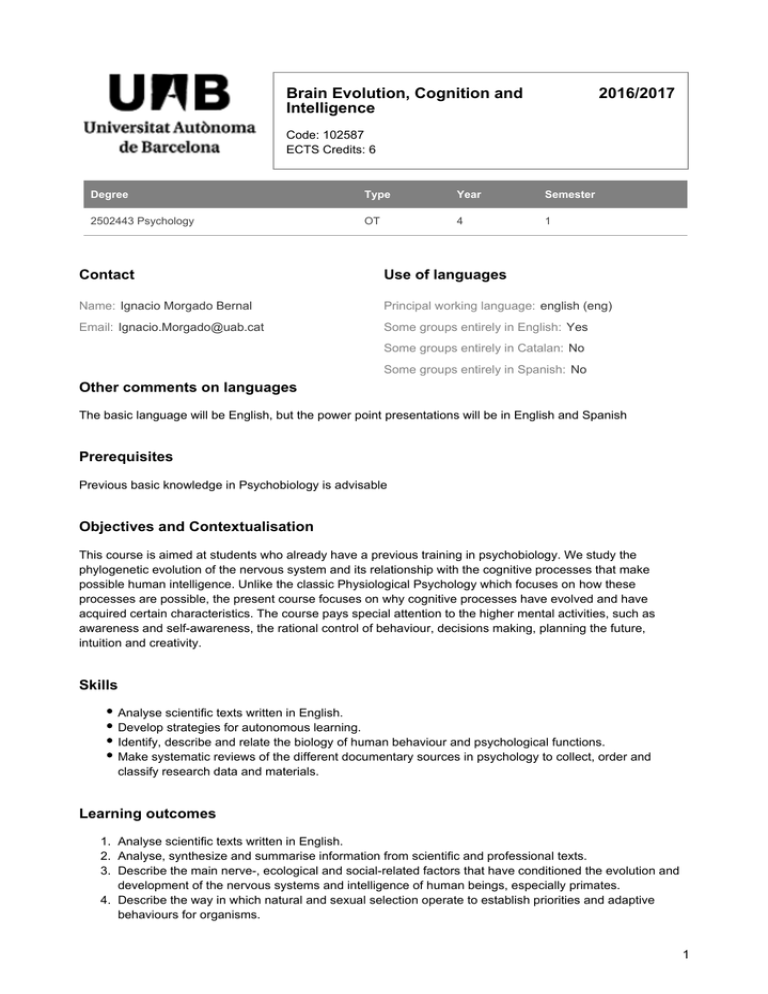
Brain Evolution, Cognition and Intelligence 2016/2017 Code: 102587 ECTS Credits: 6 Degree Type Year Semester 2502443 Psychology OT 4 1 Contact Use of languages Name: Ignacio Morgado Bernal Principal working language: english (eng) Email: [email protected] Some groups entirely in English: Yes Some groups entirely in Catalan: No Some groups entirely in Spanish: No Other comments on languages The basic language will be English, but the power point presentations will be in English and Spanish Prerequisites Previous basic knowledge in Psychobiology is advisable Objectives and Contextualisation This course is aimed at students who already have a previous training in psychobiology. We study the phylogenetic evolution of the nervous system and its relationship with the cognitive processes that make possible human intelligence. Unlike the classic Physiological Psychology which focuses on how these processes are possible, the present course focuses on why cognitive processes have evolved and have acquired certain characteristics. The course pays special attention to the higher mental activities, such as awareness and self-awareness, the rational control of behaviour, decisions making, planning the future, intuition and creativity. Skills Analyse scientific texts written in English. Develop strategies for autonomous learning. Identify, describe and relate the biology of human behaviour and psychological functions. Make systematic reviews of the different documentary sources in psychology to collect, order and classify research data and materials. Learning outcomes 1. Analyse scientific texts written in English. 2. Analyse, synthesize and summarise information from scientific and professional texts. 3. Describe the main nerve-, ecological and social-related factors that have conditioned the evolution and development of the nervous systems and intelligence of human beings, especially primates. 4. Describe the way in which natural and sexual selection operate to establish priorities and adaptive behaviours for organisms. 5. Develop strategies for autonomous learning. 1 5. Develop strategies for autonomous learning. 6. Handle scientific documentation systems. 7. Identify and describe the main taxonomies for living beings and their phylogenetic evolution, especially those related to primitives and hominids. 8. Identify and describe the nature of intelligence and the different types. 9. Identify, describe and relate the evolution of the brain to psychological processes and intelligence. 10. Plan a literature search or references, both computerized databases and libraries and newspaper archives. 11. Relate the anatomical and functional development of the nervous system with different cognitive and behavioral capacities of animals and humans. Content Basic concepts of intelligence and evolution of living beings. Heredability of intelligence. Hominids evolution. Evolution of the brain and the main cognitive capabilities. Evolution and human behavior: natural selection and sexual selection. Psychobiology of consciousness. Methodology Lecturing by the course teacher Presentations and discussions in class by the students on specific issues of the course. An individual written report in which the students answer to a series of questions on the different topics of the program. Activities Title Learning outcomes Hours ECTS 36 1.44 1, 3, 4, 5, 7, 8, 9, 11 11 0.44 1, 5 100 4 1, 3, 4, 5, 7, 8, 9, 11 Type: Directed Lecturing by the course teacher Type: Supervised Presentations and discussions in class by the students on specific issues of the course. Type: Autonomous Individual written report in which the students must answer to a series of questions on the different topics of the program. Evaluation The evaluation of the course consists of 3 evidences of learning: 2 The evaluation of the course consists of 3 evidences of learning: 1. Individual written examination on basic concepts of the subject (weight: 30%) 2. Group of students: Oral presentation (15 minutes) of a subject related to the program of the course (weight: 30%) 3. Individual oral examination on the set of themes of the course in which the student has to present and can consult his or her written report of responses on the different topics of the program (weight 40%) Evaluation activities Learning outcomes Title Weighting Hours ECTS Group of students: Oral presentation (15 minutes) of a subject related to the program of the course 30% 0.5 0.02 1, 3, 4, 9, 11 Individual oral examination on the set of themes of the course in which the student has to present and can consult his or her written report of responses on the different topics of the program 40 % 2 0.08 7, 8 Individual written examination on basic concepts of the subject 30% 0.5 0.02 2, 1, 3, 4, 5, 7, 6, 8, 9, 10, 11 Bibliography Allman, J.M. (1999) Evolving brains. Scientific American Library. Edición española "El Cerebro en Evolución", Barcelona: Ariel, 2003. Boyd, R. y Silk, J.B. (2003) How human evolved. New York: WW Norton and Co. Inc. Edición española "Como Evolucionaron los Humanos", Barcelona: Ariel, 2004. Dicke U y Roth G (2009) Evolución de la inteligencia. Mente y Cerebro 35. Inteligencia Viva (1999). Número extraordinario de Investigación y Ciencia, Barcelona. Morgado I (2006) Emocions i intel·ligència social: Una aliança entre els sentiments i la raó. Barcelona: Mina. Edición castellana "Emociones e inteligencia social: Las claves para una alianza entre los sentimientos y la razón". Barcelona: Ariel, 2007. Morgado I (2009) Psicobiología de la consciencia: conceptos, hipótesis y observaciones clínicas y experimentales. Revista de Neurología, 49 (5): 251-256. Morgado I (2012) Cómo percibimos el mundo: una exploración de la mente y los sentidos. Ariel, Barcelona. 3
